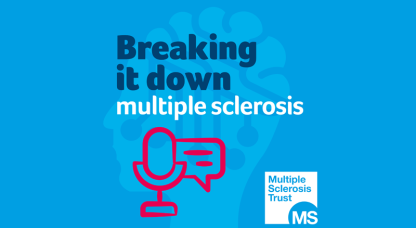Acceptance and commitment therapy (ACT, said as one word), is a type of psychological therapy that can be used in the management of conditions such as anxiety, pain and depression.
ACT uses some of the same principles as mindfulness and cognitive behavioural therapy (CBT). Rather than trying to help you to alter your thoughts and feelings, ACT encourages you to become more aware of your thoughts, feelings and beliefs and the helpful and unhelpful ways you respond. It tries to support you to become more aware of and in touch with what matters to you and to help you find ways to do those things.
If you feel that ACT may be of benefit to you, or you would like further information about psychological approaches, talk to your GP or your MS nurse.
ACT has recently begun to be studied in multiple sclerosis, and has been found to be helpful for specific symptoms that can occur in MS as well.
Pilot studies in people with MS show improved resilience, quality of life, depression and stress. Psychologists working in MS reported that training in ACT was personally and professionally helpful for them.
A study of the effects of ACT on pain experienced by people with fibromyalgia found that the approach was more effective than treatment with pain medication and anti-depressants, and improvements were still apparent when people were assessed six months later. ACT has also been shown to help reduce depression and increase quality of life scores in US veterans.
These exercises were written by Dr Sarah Gillanders, clinical neuropsychologist, and taken from our Secondary Progressive Multiple Sclerosis book. Try them out to get a sense of how an ACT approach can help you.
What are some of the thoughts, feelings and beliefs you have about MS? What is it that is playing on your mind?
- Do you have thoughts of 'why me?', 'this is not fair', 'my body is failing', 'I am no longer the person I was', 'MS has robbed me of so much'?
- Do you feel scared, angry, lost, frustrated, alone, vulnerable, judged?
- Do you have beliefs such as 'the future is bleak', 'I couldn't cope if this got any worse'?
Exercise: write some of these concerns on paper
When the thoughts, feelings and beliefs you wrote down pop up or are playing on your mind, do you:
- Shout, nip, make rude remarks; are you short tempered, tearful; or do you withdraw from others, miss appointments?
- Do you manage to tell someone how you feel, get some fresh air, listen to music, make a cup of tea, go out with a friend, go shopping etc?
Exercise: write down all the ways you respond when you feel upset
Looking at the list above, which ones are helpful and which are unhelpful? If you struggled to think of any helpful responses then take a moment to think about what might help you. How can you look after yourself when you are finding things difficult?
Exercise: make a list of helpful and unhelpful responses
Now that you have a clearer idea of the helpful and unhelpful ways you try to deal with the stress of living with multiple sclerosis, how can you do more of the helpful responses? What are some of the barriers that make it difficult?
- 'I can't talk to my husband/wife about this; they have enough on their plate'
- 'I would like to get more fresh air but I tire too quickly to go to the park'
- 'I struggle to make tea now that my arms are weak'
Exercise: what makes it difficult to respond in a helpful way to your distress?
There are often challenges to doing what is good for us. The key is to try to stay focused on what we want to do, even when these barriers are in our way.
Taking the first barrier above, does your husband/wife have so much on their plate that they can't talk to you about your MS? If it's important to you to have a close and supportive relationship with your partner, and you value the support you can give one another, then perhaps it is worth trying to open up a little more, even if that is hard to do. You might start a conversation like that by saying that you're scared of overwhelming them as it feels overwhelming to you at times, but you value the support you can give each other and want to try talking a bit more. On the other hand, if you can't get that support from your spouse, are there friends or other family members who can be that source of support?
If the barriers relate to mobility problems, then is it possible to do things differently? Perhaps you used to go to the park, but if it is fresh air that you like then is it possible to sit in the garden or on the street in front of your house instead? It's not how it used to be but you still get some of the things you like. If it is making tea that is difficult then is it possible for someone to make one in a warm travel mug so even if there is a time when you are alone, there may still be a warm cup available.
Exercise: take a look at each of your barriers and think about how you can do more of what's helpful for you


